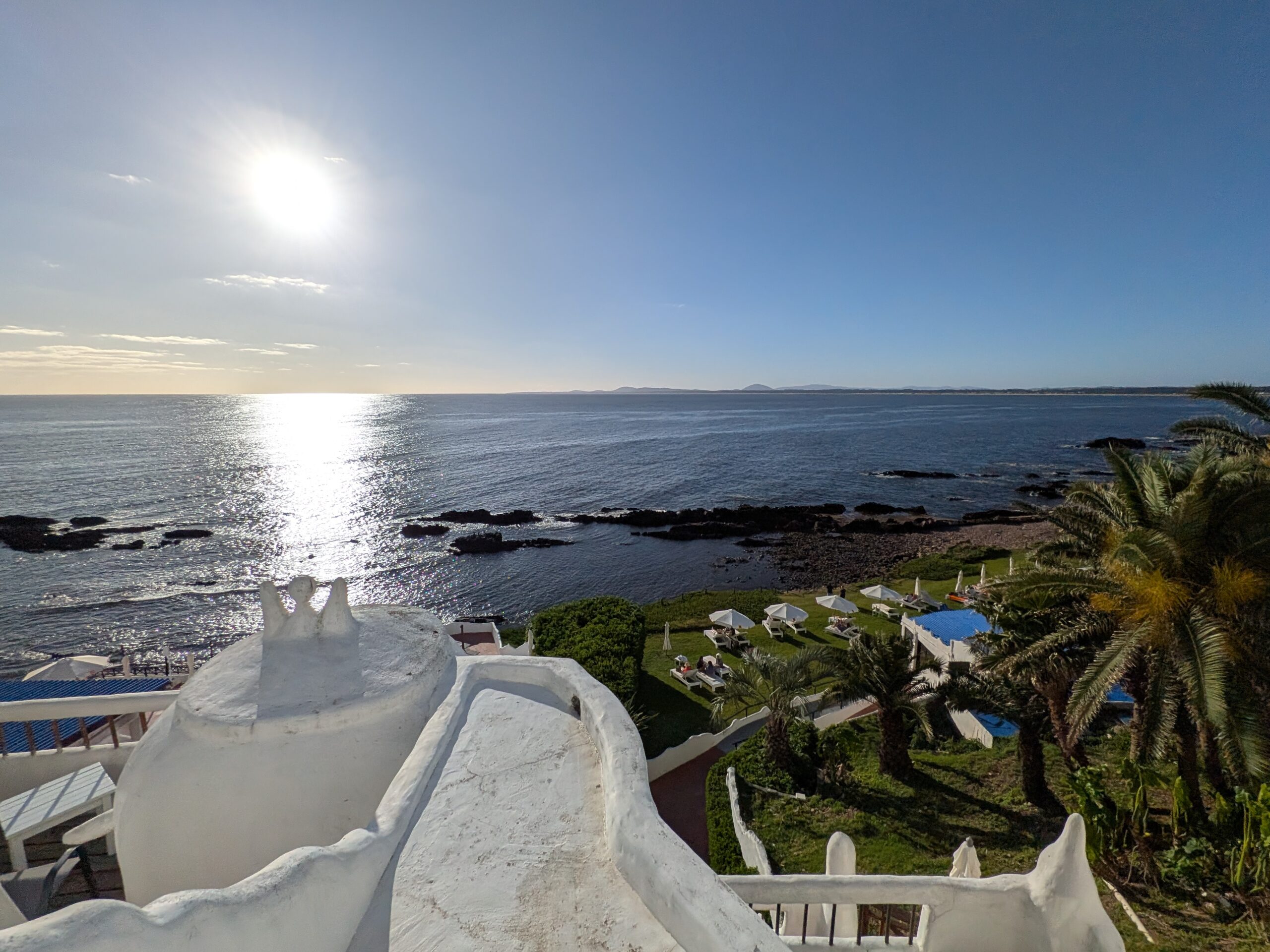At Liberation.Travel, we help you move to countries where you can live a free(r) life, or at least some aspect of your life can be free(r). Freedom is not everything; we also want a high-quality life for our clients. William Gibson said that one man’s raging dystopia is another’s hot immigration opportunity. The choice of country for a particular aspect of our lives is highly individual. Uruguay permanent residency during one visit is the newest addition to our portfolio.
Uruguay is a beautiful destination with an ocean and beaches. It is highly developed, but it also has quite a large government for many people. I would consider it a “left-libertarian” country—all the positive, traditionally left freedoms are there—freedom of speech, gay marriage, gun ownership, drug legalization, etc. is one of the best (i.e. freest) in the world. Uruguay is not a tax haven for most, with high import tariffs, progressive taxation, etc.
Ultimately, it depends on what you want to do there. If you are in your early twenties and want to build your career, you would go to something more punk—maybe Paraguay or Dubai. If you want to sit at the beach, drink coconut water (or, even better, maté), work remotely, smoke a joint, and enjoy a relaxing atmosphere with people who are nice, relaxed, and don’t cheat or steal, Uruguay is a splendid choice.
Let’s start with some context.
Introduction: Quality of Life and Economic Context
Uruguay is a small, peaceful country in South America known for its high quality of life, strong rule of law, and progressive social policies. With a population of about 3.5 million people and a relatively modest economy, Uruguay punches above its weight in terms of governance, stability, and personal freedoms.
Regarding GDP per capita, Uruguay is roughly in the middle tier globally. It is more prosperous than Paraguay by a large margin, with much better infrastructure, healthcare, and social services. Compared to Slovakia or the Czech Republic, Uruguay’s GDP per capita is slightly lower, but the cost of living is generally more affordable. When set against Germany or the United States, Uruguay’s GDP per capita is significantly lower. Still, daily life is also much less expensive—especially in terms of healthcare, education, and housing. Essential goods and services in Uruguay tend to cost less, and it has a reputation for being a safe, slow-paced, and relaxed society.
- Compared to Paraguay, it has a much higher standard of living, a more developed economy, and less corruption.
- Compared to Czechia/Slovakia: Slightly lower income levels, but comparable healthcare and education in quality and universality.
- Compared to Germany/USA, there are Lower salaries and productivity, but also a much lower cost of living and less economic pressure.
Uruguay offers a calm and orderly lifestyle with broad freedoms and reliable public services, making it an attractive place for those valuing stability and liberty.
Political System and Culture
Uruguay is a representative democratic republic with a presidential system. The President is elected for five years and cannot serve consecutive terms. The legislature is bicameral, composed of a Chamber of Deputies and a Senate. Lawmaking is methodical, requiring approval from both chambers and the President, with an option for referendums or plebiscites initiated by citizens. This potent system of direct democracy allows Uruguayans to reject laws or even amend the constitution by popular vote.
Uruguay’s political culture is marked by respect for institutional rules, moderate policy swings between center-left and center-right, and a high degree of civic engagement. The left and right often disagree on policy but are committed to democracy and constitutionalism. Unlike more polarized nations, Uruguay’s political parties usually cooperate on structural reforms and avoid undermining institutions for short-term gains.
Compared to Paraguay or Panama, Uruguay is more stable, less corrupt, and more ideologically structured. Its debates are about ideas rather than personal power or patronage networks. Compared to EU countries, Uruguay shares many characteristics with Western democracies, especially secularism, civil liberties, and welfare policies. Yet, it retains independence from supranational entities, allowing more sovereign decision-making, although it is a member of Mercosur, which imposes some limits, especially regarding tariffs.
Libertarian Perspective on Freedom in Uruguay
Uruguay is not a libertarian utopia but offers a compelling balance between personal freedoms and a relatively honest, transparent state. From a libertarian perspective, Uruguay excels in many areas—especially civil liberties and rule of law—but has room for improvement in terms of economic freedom and the size of the state.
Economic Freedom
Uruguay ranks highly in the region for property rights, contract enforcement, and corruption control. Businesses can operate predictably, and the legal system is functional and independent. Foreign and local investors are treated equally, and expropriation is virtually nonexistent.
However, libertarians would point to several downsides:
- High taxes: Income taxes up to 36%, corporate taxes at 25%, VAT at 22%, and even a net wealth tax (for wealth inside Uruguay).
- Large state sector: The Government controls key industries such as energy, telecommunications, and fuel through state monopolies.
- Strict labor regulations: Employment laws strongly favor workers, making hiring and firing costly and bureaucratic.
Despite these interventions, Uruguay’s regulatory environment is honest and transparent, which libertarians may see as a redeeming feature. It may not be a low-tax, low-regulation haven, but it is a place where rules are known, predictable, and respected, which counts for a lot in practice.
Personal Liberties
This is where Uruguay shines from a libertarian point of view:
- Gun rights: Uruguay has the highest rate of gun ownership in Latin America. Civilians can own multiple firearms with a permit, though registration and limits still apply.
- Drug legalization: It was the first country in the world to legalize cannabis fully. Adults can grow, join clubs, or buy marijuana from licensed pharmacies. While the state controls distribution and tracks users, the approach is based on harm reduction and autonomy.
- Freedom of speech and assembly: Uruguay has a vibrant free press, unrestricted internet, and legal protection for protests and demonstrations.
- Privacy: Data protection laws are strong, and government surveillance is limited. Judicial warrants are required for most intrusions into private communications.
Although libertarians may raise concerns about registration requirements (e.g., for cannabis users or gun owners), the overall environment supports individual autonomy far more than most nations.
Stability and Predictability
One of Uruguay’s most libertarian-compatible features is its predictable and stable governance. Laws change slowly and transparently, often requiring broad political consensus or direct democratic approval. Corruption is extremely low, and citizens and businesses can plan for the long term.
This high degree of legal predictability and institutional reliability makes Uruguay an appealing environment for anyone who values liberty in a practical, real-world context.

What is it like?
Uruguay offers a relaxed, comfortable lifestyle. The pace of life is slower than in most developed countries, and people tend to be warm and courteous. Crime rates are low by Latin American standards, and the atmosphere—especially in Montevideo or coastal towns like Punta del Este—is peaceful and secure.
- Atmosphere: Calm, laid-back, and orderly. Public spaces are clean, with a strong sense of civic responsibility.
- People: Uruguayans are polite, friendly, and well-educated. They tend to value fairness and respect for others’ rights.
- Nature and Beaches: Uruguay boasts beautiful, clean Atlantic beaches and mild weather year-round. The coastline is accessible and often uncrowded.
- Infrastructure: Roads, utilities, and internet services are well developed. Public transportation is modest but reliable.
- Healthcare and Services: Uruguay has a universal healthcare system with both public and private options. Quality is generally good, and wait times are moderate.
- Prices: Daily life is more affordable than in Western Europe or the U.S. Food, transport, rent, and healthcare cost less, though imported goods can be expensive.
Overall, Uruguay provides a high quality of life with a strong emphasis on personal security, education, and cultural openness. It’s a place where people enjoy their freedoms without high stress or social tension.
Conclusion
Uruguay is one of the freest, most stable, and most civilly respectful countries in Latin America—and arguably in the world. From a libertarian lens, it is a compromise: not a minimal state, but a respectable and predictable one where personal liberty is unusually well protected and where the state’s reach—though still broad—is exercised with constraint, transparency, and public accountability.
Uruguay is a country worth watching—and perhaps even living in for anyone who values freedom, order, and quality of life.
